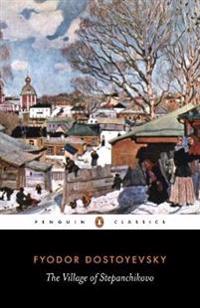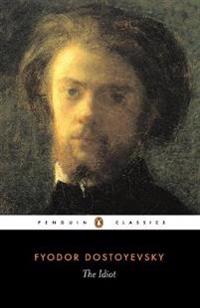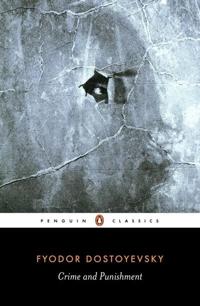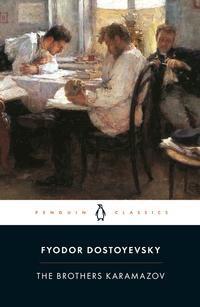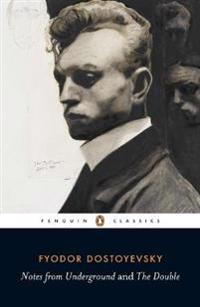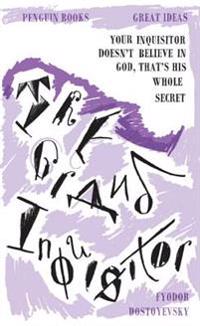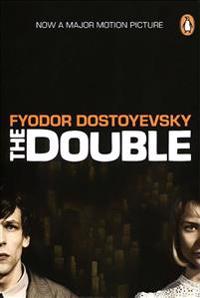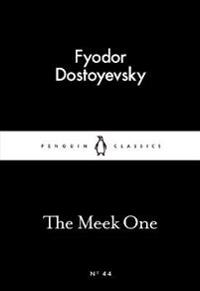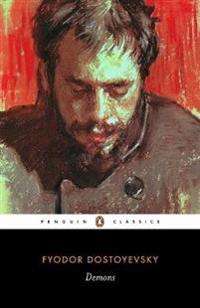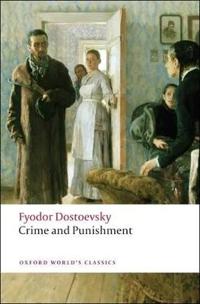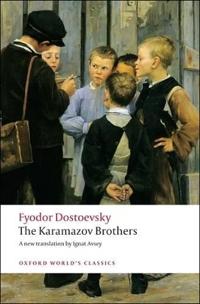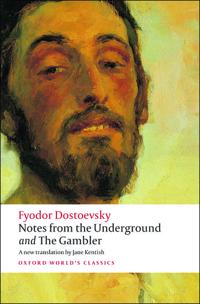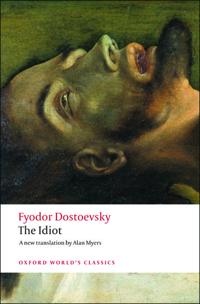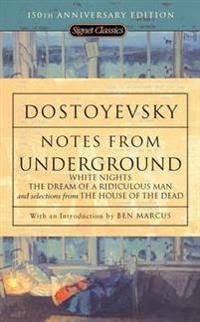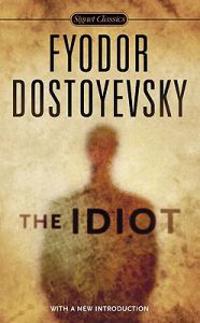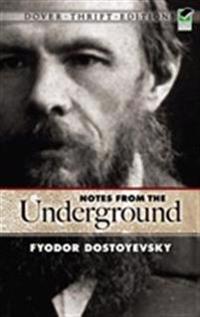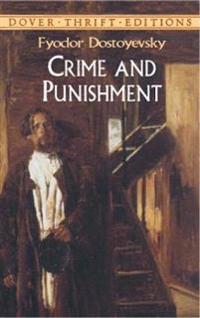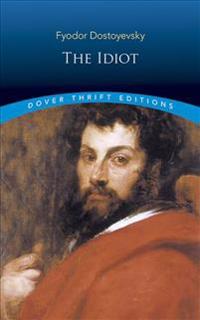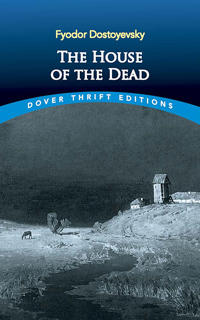The Village of Stepanchikovo (Storpocket)
avFyodor Dostoyevsky
ISBN: 9780140446586 - UTGIVEN: 199506Summoned to the country estate of his wealthy uncle Colonel Yegor Rostanev, the young student Sergey Aleksandrovich finds himself thrown into a startling bedlam. For as he soon sees, his meek and kind-hearted uncle is wholly dominated by a pretentious and despotic pseudo-intellectual named Opiskin, [...]
The Idiot (Storpocket)
avFyodor Dostoyevsky
ISBN: 9780140447927 - UTGIVEN: 200405Fyodor Dostoyevsky's "The Idiot" is an immaculate portrait of innocence tainted by the brutal reality of human greed. This "Penguin Classics" edition is translated from the Russian by David McDuff, with an introduction by William Mills Todd III. Returning to St Petersburg from a Swiss sanatorium, th[...]
Crime and Punishment (Storpocket)
avFyodor Dostoyevsky
ISBN: 9780140449136 - UTGIVEN: 200301A thrilling study of guilt and power, the "Penguin Classics" edition of Fyodor Dostoyevsky's "Crime and Punishment" is translated with an introduction and notes by David McDuff. Raskolnikov, a destitute and desperate former student, wanders through the slums of St Petersburg and commits a random mur[...]
The Brothers Karamazov (Storpocket)
avFyodor Dostoyevsky
ISBN: 9780140449242 - UTGIVEN: 200302Fyodor Dostoyevsky's powerful meditation on faith, meaning and morality, "The Brothers Karamazov" is translated with an introduction and notes by David McDuff in "Penguin Classics". When brutal landowner Fyodor Karamazov is murdered, the lives of his sons are changed irrevocably: Mitya, the sensuali[...]
Notes from Underground and the Double (Storpocket)
avFyodor Dostoyevsky
ISBN: 9780140455120 - UTGIVEN: 200901Collected here in "Penguin Classics" are two of Fyodor Dostoyevsky's shorter works, "Notes from Underground and The Double", translated by Ronald Wilks with an introduction by Robert Louis Jackson. Alienated from society and paralysed by a sense of his own insignificance, the anonymous narrator of D[...]
The Grand Inquisitor (Häftad)
avFyodor Dostoyevsky
ISBN: 9780141043920 - UTGIVEN: 200908Vividly imagining the second coming and capture of Christ during the time of the Spanish Inquisition, this parable recounted in "The Brothers Karamazov" is a profound, nuanced exploration of faith, suffering, human nature and free will. Included here too are Dostoyevsky's powerful and disturbing wri[...]
The Double (Häftad)
avFyodor Dostoyevsky
ISBN: 9780141396187 - UTGIVEN: 2014-03This is an official tie-in edition to accompany Richard Ayoade's brilliant new film based on Dostoyevsky's deliciously dark and slyly funny novel. The Double stars Oscar nominee Jesse Eisenberg (The Social Network) and Mia Wasikowska (Jane Eyre) with support from Chris O'Dowd, Sally Hawkins, Paddy C[...]
The Meek One (Häftad)
avFyodor Dostoyevsky
ISBN: 9780141397481 - UTGIVEN: 2015-02'I could see that she was still terribly afraid, but I didn't soften anything; instead, seeing that she was afraid I deliberately intensified it.' In this short story, Dostoyevsky masterfully depicts desperation, greed, manipulation and suicide. Introducing Little Black Classics: 80 books for Pengui[...]
Demons (Pocket)
avFyodor Dostoyevsky, Robert A. (TRN) Maguire, Ronald (EDT) Meyer
ISBN: 9780141441412 - UTGIVEN: 2008-06"Demons", also known as "The Possessed" or "The Devils", is a dark masterpiece that evokes a world where the lines between and good and evil long ago became blurred. This "Penguin Classics" edition of Fyodor Dostoyevsky's "Demons" is translated by Robert A. Maguire and edited by Ronald Meyer, with a[...]
Crime and Punishment (CD-bok)
avFyodor Dostoyevsky
ISBN: 9780141804507 - UTGIVEN: 2003-01Raskolnikov, a destitute and desperate former student, wanders through the slums of St. Petersburg and commits a random murder without remorse. He imagines himself to be a great man, a Napoleon: beyond conventional moral law. But as he embarks on a dangerous game of cat and mouse with a suspicious p[...]
Crime and Punishment (Häftad)
avFyodor Dostoyevsky, Zohar Lazar
ISBN: 9780143107637 - UTGIVEN: 2015-07A truly great translation. . .This English version . . ." "really is better. A. N. Wilson, "The Spectator"
This acclaimed new translation of Dostoyevsky s psychological record of a crime gives his dark masterpiece of murder and pursuit a renewed vitality, expressing its jagged, staccato urgency [...]Crime and Punishment (Häftad)
avFyodor Dostoyevsky
ISBN: 9780199536368 - UTGIVEN: 200806Crime and Punishment is the story of a murder committed on principle, of a killer who wishes by his action to set himself outside and above society. A novel of fearful tension, physical, and psychological, it is pervaded by Dostoevsky's sinister evocation of St Petersburg, yet in the life of its gl[...]
The Karamazov Brothers (Häftad)
avFyodor Dostoyevsky
ISBN: 9780199536375 - UTGIVEN: 200806Dostoevsky's last and greatest novel, The Karamazov Brothers (1880) is both a brilliantly told crime story and a passionate philosophical debate. The dissolute landowner Fyodor Pavlovich Karamazov is murdered; his sons - the atheist intellectual Ivan, the hot-blooded Dmitry, and the saintly novice [...]
Notes from the Underground (Häftad)
avFyodor Dostoyevsky
ISBN: 9780199536382 - UTGIVEN: 200806Notes from the Underground (1864) is one of the most profound works of nineteenth-century literature. A probing, speculative book, often regarded as a forerunner of the Existentialist movement, it examines the important political and philosophical questions that were current in Russia and Europe at [...]
The Idiot (Pocket)
avFyodor Dostoyevsky, Alan Myers, William Leatherbarrow
ISBN: 9780199536399 - UTGIVEN: 200808Into a compellingly real portrait of nineteenth-century Russian society, Dostoevsky introduces his ideal hero, the saintly Prince Myshkin. The tensions subsequently unleashed by the hero's innocence, truthfulness, and humility betray the inadequacy of his moral idealism and disclose the spiritual em[...]
Memoirs from the House of the Dead (Pocket)
avFyodor Dostoyevsky
ISBN: 9780199540518 - UTGIVEN: 2008-08-01In this almost documentary account of his own experience of penal servitude in Siberia, Dostoevsky describes the physical and mental suffering of the convicts, the squalor, the degradation, in relentless detail - even down to the intricate procedure whereby the men strip for the bath without removin[...]
The Brothers Karamazov (Häftad)
avFyodor Dostoyevsky
ISBN: 9780393926330 - UTGIVEN: 2011-05This second edition is based on a significantly revised translation by Susan McReynolds. It is accompanied by a detailed introduction, a pronunciation and explanation key for the novel's main characters, and greatly revised and expanded explanatory annotations.[...]
Notes from Underground: 150th Anniversary Edition (Pocket)
avFyodor Dostoyevsky, Ben Marcus
ISBN: 9780451529558 - UTGIVEN: 200411A collection of powerful stories by one of the masters of Russian literature, illustrating the author's thoughts on political philosophy, religion and above all, humanity.
[...]Crime And Punishment (Pocket)
avFyodor Dostoyevsky
ISBN: 9780451530066 - UTGIVEN: 2006-03-07Determined to overreach his humanity and assert his untrammelled individual will, Raskolnikov, an impoverished student living in the St. Petersburg of the Tsars, commits an act of murder and theft and sets into motion a story which, for its excrutiating suspense, its atmospheric vividness, and its p[...]
The Brothers Karamazov (Pocket)
avFyodor Dostoyevsky, Manuel Komroff
ISBN: 9780451530608 - UTGIVEN: 200712The Idiot (Pocket)
avFyodor Dostoyevsky
ISBN: 9780451531520 - UTGIVEN: 201004A classic by a Russian master
Prince Myshkin, the idiot, is an almost comically innocent Christ figure in a land of sinners, one whose faith in beauty contrasts sharply with that of his society's.
[...]Notes from the Underground (Häftad)
avFyodor Dostoyevsky
ISBN: 9780486270531 - UTGIVEN: 199207Darkly fascinating short novel depicts the struggles of a doubting, supremely alienated protagonist in a world of relative values. Seminal work introduced moral, religious, political and social themes that dominated Dostoyevsky's later masterworks. Constance Garnett's authoritative translation is re[...]
Crime and Punishment (Pocket)
avFyodor Dostoyevsky, Constance Black Garnett, Constance Black Garnett
ISBN: 9780486415871 - UTGIVEN: 200108Crime and Punishment (1866) is the story of a murder committed on principle, of a killer who wishes by his action to set himself outside and above society. A novel of great physical and psychological tension, pervaded by Dostoevsky's sinister evocation of St Petersburg, it also has moments of wild h[...]
The House of the Dead (Pocket)
avFyodor Dostoyevsky, Constance Black Garnett, Constance Black Garnett
ISBN: 9780486434094 - UTGIVEN: 200404Accused of political subversion as a young man, Dostoyevsky was sentenced to 4 years of hard labor at a Siberian prison camp. Years later, he developed this semi-autobiographical memoir of a man condemned to penal servitude for murdering his wife. This haunting and remarkable work ranks amoung Dosto[...]

